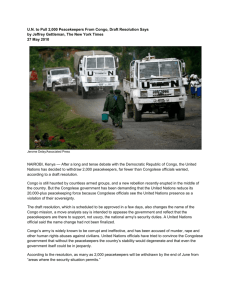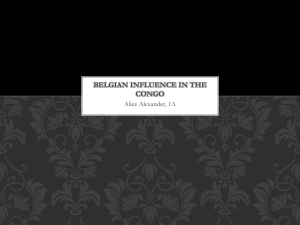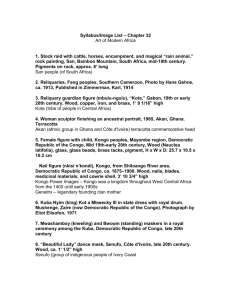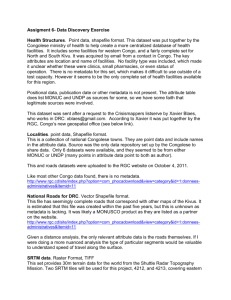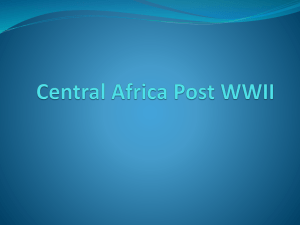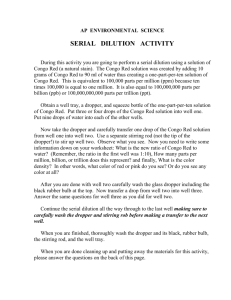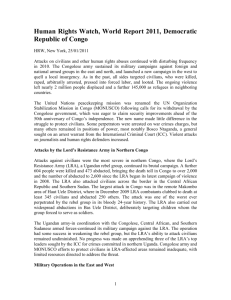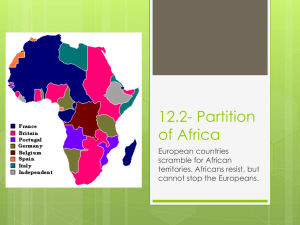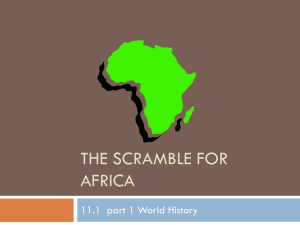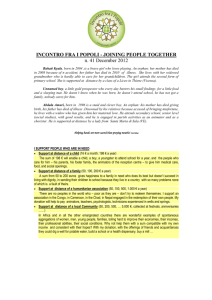Congo-Brazzaville
advertisement
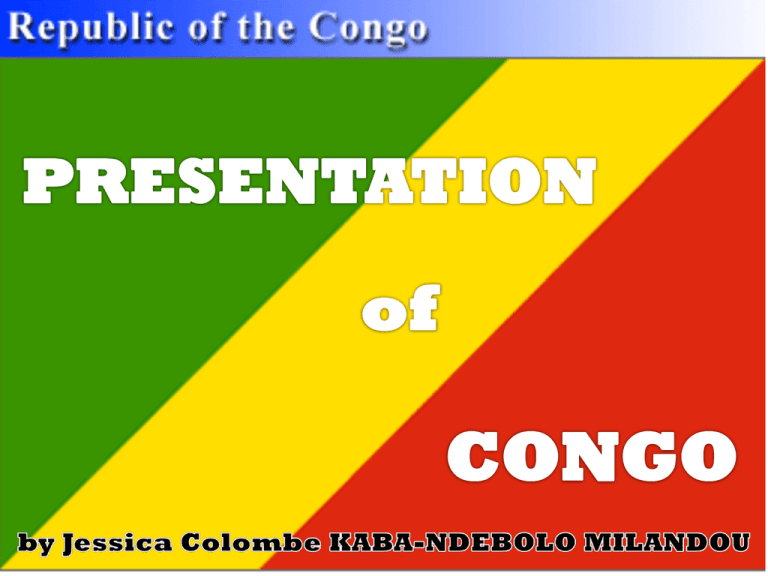
SUMMARY I- CONGO MAP....…………………. II- COAT OF ARMS..………………. III- GEOGRAPHIC DATA…………. IV- CONGOLESE FLAG……………. V- DEMOGRAPHIC DATA….………. VI- GENERAL DATA….…………….. VII- ECONOMY............. …………… VIII- AGRICULTURE…………………. IX- EDUCATION............................... X- HEALTH....................................... XI- CULTURE………………………… XII- CONGOLESE FOOD…………….. XIII- MONUMENTS AND LANDSCAPES.. THE MAP OF CONGO The Congo is in the center Africa, limited .in North by Cameroon and the Central African Republic .to the east by the Democratic Republic of Congo which is formerly Zaire, .the south by Anglola .in the Southwest there's the Gulf of Guinea Equatorial .and west by Gabon. it consists of the equatorial forest, a rich savanna, large rivers rich in fish. the legendary Congo River is the second most powerful river in the world after the Amazon which separates the two closest capital in the world Brazzaville and Kinshasa COAT OF ARMS • In the center of the shield, there is a lion which is the symbol of protection carrying a torchlight. . Two of the elephants support the shield. . In the lower part, on a belt you can read the national motto: Unity, Work, Progress. CONGOLESE FLAG Nature of the country GEOGRAPHIC DATA Location: Center Africa . Area: 342.000 km² . Capital: Brazzaville . Principal cities: Pointe-Noire, Nkayi, Loubomo, Ouesso, Owando, Dolisie, Mossendjo . Official Language: French . Independence day: 15 August 1960 DEMOGRAPHIC DATA 1-Population: 4 243 929 h. 2-DensitY: 12 h./km² 3-Main ethnic group: Kongo, Téké, Mbochi, Oubanguiens, Nzebi, Sangha 4-Development: +1,77% 5-Life expectancy : 55,8 ans 6-literacy rate : 81,1% 7-Religion: Christianism, Animism & Islam GENERAL DATA Denis Sassou-Nguesso is a Congolese politician born on November 23, 1943 in Edou. He was President of the People's Republic of Congo from 1979 to 1992 and is the current President of the Republic of Congo since 1997. CONGOLESE PRESIDENTS (1961 A 1969) Alphonse MASSAMBAT -BEBAT (1963-1968) Abbé Fulbert YOULOU (1961-1963) Augustin PEIGNEL 09-1968) CONGOLESE FROM 1969 TILL TODAY Marien NGOUABI (1969-1977) Pascal LISSOUMBA (1992-1997) Joachim YHOMBIOPANGO (1977-1979) Dénis SASSOUNGUESSO (1979-1992 1997- up to now) ECONOMIC Congo is a developing country included in the Initiative heavily in debt poor countries ,That point was reached in January 2010, with the approval of the World Bank and the International Monetary Funds .Congolese economy remain mainly on the exploitation of hydrocarbons along the Atlantic coast, this activity represents approximately 90 % of exports of the country. • The oil exploration and the production, concentrated in the periphery of Pointe-noire make of it the economic capital of the country. • Wood represents a significant part of the exportation of Congo, whose surface is covered with forests with nearly 60 %, for a total of 21 million hectares. AGRICULTURE • Most of the agricultural production (manioc, fruit and vegetables) is consumed locally; nevertheless, the agricultural Company and industrial refining of sugar (SARIS), established in Nkayi in Bouenza markets its products in other countries of central Africa. - Agricultural working population (2004) = 37.32% - Starts from agricultural PIB in the total PIB (2004) = 5.8% - Production of cereals in thousands of tons =9 (2004) • The agricultural congolese production is primarily: the Cassava, the Yam, Sweet potato, Banana, Corn, Rice, sorghum and the millet, the groundnut, the bean, the nut of palm, cotton, the cane has sugar, the cocoa, the coffee, the tea, the tobacco . EDUCATION The education system in Republic of Congo is managed by three government departments, such as: • The ministry for primary education and secondary education, in charge of elimination of illiteracy (MEPSA); • The ministry for technical and professional teaching (METP) • And the ministry for the higher education. Congo-Brazzaville is one of the countries of Africa having the highest rate of schooling. It is estimated at approximately 83%. The education system congolais is composed of it of: 1- General education Pre-school, Primary, College, 2- Technical Teaching Center trade, Technical school, Vocational school 3- University NB: The rate of schooling of the girls is approximately 42%. HEALTH •In Republic of Congo the medical system includes/understands two sectors, namely: the sector public and the private sector. •The private sector not being controled, only the statistical data and the various levels of the operation of the public sector are taken into consideration. •The most frequent diseases within the country are: Paludism, Measles, Diarrhoea, the Yellow fever, Influenzas etc. Cultures • The presence of many ethnos groups and formerly of various structures political (Kongo Empire kingdom of Loango Teke kingdom, chefferies of North) equipped the current country with a great diversity of traditional cultures and as many old artistic expressions. CONGOLESE FOOD SOME CONGO PICTURE Monument and landscape Pointe-Noire beach Sunset at Pointe-Noire Kouilou river Niari river Congo river de Gaulle Square, in honor of General de Gaulle between 1942-1945 Roundabout instead of June 5, symbol vestige of the civil war of 1997 Jacques Opagault Founder of MSA (Mouvement Socialiste Africain) in 1960 Nanga lake, near Pointe-Noire Total marcket of Brazzaville Monument funerary of Bas-Congo Armory official of the Republic of Congo in 1997 Restaurant Abri Côtier at Pointe Noire is one of the monuments Brazzaville (capital of the Republic of Congo) that have the greatest architectural interest
